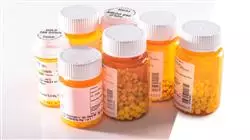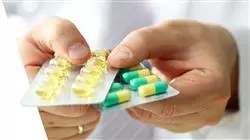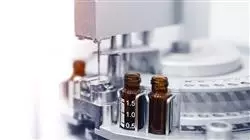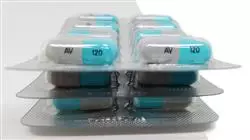University certificate
The world's largest faculty of pharmacy”
Why study at TECH?
TECH presents this Postgraduate certificate as an unparalleled opportunity to get up to date on the latest developments in Hospital Pharmacology of the Nervous System in a 100% online way"

The study of the nervous system and its in-depth knowledge has been one of the most complex obstacles that science, and more specifically medicine, has had to face. To this day, the epidemiology of many pathologies that affect human beings is still unknown, which hinders the work not only of health professionals, but also of the professionals who collaborate in their work by providing alternatives for their treatment, such as drugs. However, in recent years considerable progress has been made in the knowledge of the already established psychiatric and neurological diseases such as Epilepsy, Migraine, different types of stroke or cerebral edema, among others, which has allowed the design of formulas that help patients suffering from them to significantly improve their quality of life.
With all this, TECH has designed a complete program focused on Hospital Pharmacology of the Nervous System . This is a program oriented to serve as a guide for graduates who need to get up to date in this field. Thus, through 300 hours of the best theoretical, practical and additional content, the specialist will be able to delve into the latest developments associated with the different diseases, in addition to analyzing the latest recommendations based on the clinical criteria of the patient and whether they are adults or children.
During the 6 weeks of the program, the specialist will have access to a 100% online Virtual Campus, where the entire syllabus will be hosted from the beginning of the academic experience. In addition, all the content can be downloaded for consultation when you do not have coverage or when you have completed your relationship with this university. Thus, TECH guarantees that you will be able to organize the teaching calendar according to your own availability, eliminating the obstacles that make it difficult to combine the course of this program with the hospital activity.
You will be able to work with the latest advances in treatments for Epilepsy, Migraine and Myasthenia Gravis through 300 hours of the best theoretical, practical and additional content"
This Postgraduate certificate in Hospital Pharmacology of the Nervous System contains the most complete and up-to-date scientific program on the market. The most important features include:
- The development of practical cases presented by experts in Pharmacy, Hospital Management, among others
- Graphic, schematic, and practical contents with which they are created, provide scientific and practical information on the disciplines that are essential for professional practice
- Practical exercises where self-assessment can be used to improve learning
- Its special emphasis on innovative methodologies
- Theoretical lessons, questions to the expert, debate forums on controversial topics, and individual reflection assignments
- Content that is accessible from any fixed or portable device with an Internet connection
A university qualification that you can access from the mobile device of your choice, anytime, anywhere, or by downloading its materials to consult them offline"
The program’s teaching staff includes professionals from sector who contribute their work experience to this educational program, as well as renowned specialists from leading societies and prestigious universities.
Its multimedia content, developed with the latest educational technology, will provide the professionals with situated and contextual learning, i.e., a simulated environment that will provide an immersive education programmed to learn in real situations.
The design of this program focuses on Problem-Based Learning, by means of which the professionals must try to solve the different professional practice situations that are presented throughout the academic course. For this purpose, the students will be assisted by an innovative interactive video system created by renowned experts.
The program includes different sections for the application of drugs depending on the age of the patient, so you can get up to date on the characteristics of each one"

You will work with the latest neuropharmacological recommendations with multiple resources to fix the knowledge in a dynamic and effective way"
Syllabus
TECH is a pioneer in the university panorama for its effective use of the Relearning methodology. This pedagogical strategy consists of reiterating the most important concepts throughout the syllabus, so that the graduates can catch up without having to invest extra hours in studying. In addition, it focuses on multidisciplinary academic experiences by including dozens of hours of diverse audiovisual material in the resources, which adds a dynamic character to the program, something that students tend to appreciate.

All the content of this program can be downloaded to any device with an Internet connection for consultation, even after the academic experience has been completed"
Module 1. Pharmacology of Epilepsy, Migraine and Myasthenia Gravis
1.1. Adult Patient Seizures
1.1.1. Classification of Seizures
1.1.2. Differential diagnosis and clinical evaluation
1.1.3. Neuroimaging Studies in Diagnosis
1.1.4. Pharmacological treatment of seizures in the adult patient
1.2. Seizures in the pediatric patient
1.2.1. Classification of seizures in the pediatric patient
1.2.2. Differential diagnosis and clinical evaluation of seizures in the pediatric patient
1.2.3. Neuroimaging studies in the diagnosis of seizures in the pediatric patient
1.2.4. Febrile seizures in childhood
1.3. Status Epilepticus (SE) in the adult patient
1.3.1. Diagnosis and clinical evaluation of Status Epilepticus
1.3.2. Neurophysiological evaluation and neuroimaging in Status Epilepticus
1.3.3. Causes and triggers of Status Epilepticus in adults
1.3.4. Emergency management and treatment of Status Epilepticus in the adult patient
1.4. SE in the pediatric patient
1.4.1. Diagnosis and clinical evaluation of Status Epilepticus in the pediatric patient
1.4.2. Neurophysiological assessment and neuroimaging in pediatric Status Epilepticus
1.4.3. Causes and triggers of Status Epilepticus in children
1.4.4. Emergency management and treatment of Status Epilepticus in the pediatric patient
1.5. Management of Myasthenia Gravis (MG)
1.5.1. Classification of Myasthenia Gravis
1.5.2. Pharmacological Treatment of Myasthenia Gravis
1.5.3. Management of myasthenic crisis and acute exacerbations of myasthenia gravis
1.5.4. Immunomodulatory and biological therapies in myasthenia gravis
1.6. Headache and Migraine in the adult patient
1.6.1. Classification of primary and secondary headaches
1.6.2. Clinical evaluation and differential diagnosis of headache and Migraine in the adult patient
1.6.3. Initial therapeutic approach and management of episodic migraine
1.6.4. Migraine prophylaxis and prevention of chronic migraine headaches
1.7. Headache and Migraine in the pediatric patient
1.7.1. Classification of primary and secondary headaches in children
1.7.2. Clinical evaluation and differential diagnosis of headache and Migraine in the pediatric patient
1.7.3. Differences in the presentation and manifestation of Migraine in children and adults
1.7.4. Acute pharmacological treatment of migraine attacks in children
1.8. Hypertensive Emergencies
1.8.1. Classification and categories of hypertensive emergency
1.8.2. Clinical Evaluation and Diagnosis of Hypertensive Emergencies
1.8.3. Complementary tests and laboratory studies for the evaluation of hypertensive emergency
1.8.4. Differentiation between hypertensive emergency and hypertensive urgency
1.9. Pharmacology of Mucolytics and Expectorants in Respiratory Diseases
1.9.1. Pharmacokinetics of antiepileptic drugs
1.9.2. Pharmacological interactions of antiepileptic drugs
1.9.3. Combination treatment strategies
1.9.4. Use of antiepileptic drugs in special populations
1.10. Emerging and developing therapies for Migraine treatment
1.10.1. Therapies specifically targeting the pathophysiology of Migraine
1.10.2. Monoclonal therapies directed against alcitonin gene-related peptide (CGRP) in Migraine
1.10.3. PDE4 inhibitors as an emerging treatment for Migraine
1.10.4. Use of monoclonal antibodies in the prophylactic treatment of Migraine
Module 2. Pharmacology of the Central Nervous System
2.1. Ischemic Strokes
2.1.1. Advances in the early diagnosis of ischemic stroke
2.1.2. Evaluation and classification of the risk of ischemic stroke in asymptomatic patients
2.1.3. Thrombolytic treatment strategies in the acute phase of ischemic stroke
2.1.4. Biomarkers in Ischemic Stroke
2.2. Management of hypertension in acute ischemic stroke
2.2.1. Current guidelines and protocols for the management of hypertension in acute ischemic stroke
2.2.2. Pharmacologic treatment of hypertension in the acute phase of ischemic stroke
2.2.3. Blood pressure control strategies in ischemic stroke with thrombolytic therapy
2.2.4. Endovascular therapy and blood pressure control in acute ischemic stroke
2.3. Oropharyngeal angioedema due to Alteplase
2.3.1. Risk factors for the development of oropharyngeal angioedema after Alteplase administration
2.3.2. Clinical and differential diagnosis of oropharyngeal angioedema in patients treated with Aateplase
2.3.3. Management and treatment of acute oropharyngeal angioedema by Alteplase
2.3.4. Evaluation and follow-up of patients with a history of oropharyngeal angioedema prior to administration of Alteplase
2.4. Hemorrhagic stroke: intracerebral hemorrhage (ICH)
2.4.1. Diagnosis and classification of intracerebral hemorrhage in hemorrhagic stroke
2.4.2. Medical and pharmacological treatment of acute intracerebral hemorrhage
2.4.3. Neurosurgical and endovascular management of intracerebral hemorrhage
2.4.4. Multidisciplinary approach in the care of the patient with intracerebral hemorrhage
2.5. Cerebral edema
2.5.1. Cytotoxic versus vasogenic cerebral edema
2.5.2. Clinical evaluation and imaging of cerebral edema
2.5.3. Pharmacological strategies for the reduction of cerebral edema in specific pathologies
2.5.4. Effect of cerebral edema
2.6. Opioid overdose
2.6.1. Pharmacokinetics and pharmacodynamics of opioids involved in overdose
2.6.2. Role of the hospital pharmacist in opioid overdose prevention and education
2.6.3. Management of opioid withdrawal in the hospital setting
2.6.4. Naloxone and its use as an antidote in opioid overdose reversal
2.7. Opioid Withdrawal Syndrome
2.7.1. Epidemiology and risk factors for the development of Opioid Withdrawal Syndrome
2.7.2. Clinical evaluation and diagnosis of Opioid Withdrawal Syndrome in hospitalized patients
2.7.3. Pharmacological management of Opioid Withdrawal Syndrome in the hospital setting
2.7.4. Use of opioid agonist and antagonist drugs in the treatment of withdrawal syndrome
2.8. Agitated Patient Management
2.8.1. Epidemiology and risk factors associated with agitation in hospitalized patients
2.8.2. Pharmacotherapy for the management of acute agitation in inpatients
2.8.3. Use of antipsychotics and benzodiazepines in the treatment of agitation
2.8.4. Safety and prevention of complications in the management of the agitated patient
2.9. Acute pain management in the patient with substance abuse
2.9.1. Pharmacological interactions between analgesics and substances of abuse
2.9.2. Pharmacological strategies for acute pain management in patients with opioid abuse
2.9.3. Acute pain Treatment in patient with Alcohol abuse
2.9.4. Assessment and management of addiction risk in patients with substance abuse requiring analgesia
2.10. Alcohol Withdrawal Syndrome
2.10.1. Clinical evaluation and diagnosis of Alcohol Withdrawal Syndrome in hospitalized patients
2.10.2. Pharmacotherapy for the management of Alcohol Withdrawal Syndrome in the inpatient setting
2.10.3. Use of benzodiazepines and other drugs in the treatment of Alcohol Withdrawal Syndrome
2.10.4. Role of the hospital pharmacist in the management of Alcohol Withdrawal Syndrome

After completing this program, you will have mastered the complexities of hypertensive emergencies through the use of the latest drugs”
Postgraduate Certificate in Hospital Pharmacology of the Nervous System
The Postgraduate Certificate in Hospital Pharmacology of the Nervous System, is an important specialization that provides students with the opportunity to acquire the necessary knowledge to understand and treat diseases related to the central and peripheral nervous system. This academic program, of great relevance in the health field, offers a solid training. One of the main benefits of this program is the possibility of expanding knowledge about the drugs used in the treatment of neurological and psychiatric diseases. Students will learn about the different drugs available in the market, their mechanisms of action, their side effects and the appropriate dosages for each patient. This information is crucial to achieve effective and safe results in the treatment of patients with nervous system diseases.
Add value to your resume with this Postgraduate Certificate
Another important aspect of this specialization is the understanding of pharmacology as applied to different age groups. Students will learn about drugs used in the treatment of neurological and psychiatric diseases in children, adolescents, adults and the elderly. This will enable future health professionals to adapt treatments to the specific needs of each patient and achieve optimal results. All training is delivered online, where participants will be able to manage their time according to their needs without having conflicts with their jobs or other obligations. At TECH we are ranked by Forbes as the best digital university in the world, since we offer ten thousand academic degrees in 10 different languages. The Postgraduate Certificate in Hospital Pharmacology of the Nervous System, is essential for those interested in specializing in the area of pharmacology and treatment of neuropsychiatric diseases. With a solid theoretical preparation, students will acquire the knowledge and skills necessary to provide effective and safe treatment to patients. Do not hesitate to take advantage of this opportunity and train in an area of great demand and relevance in the health field.







